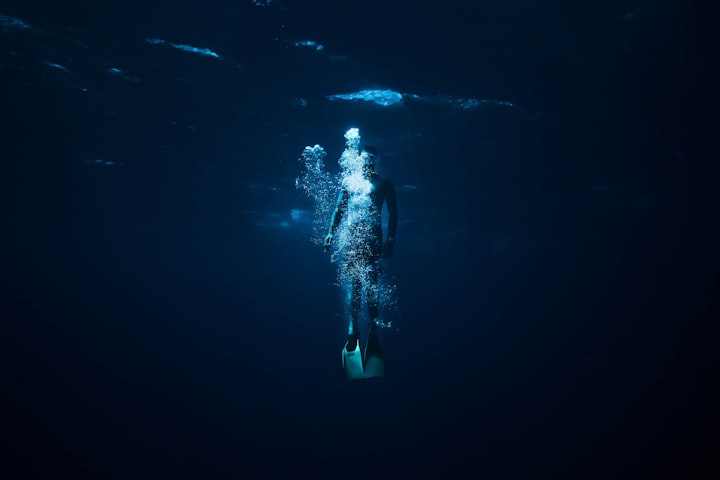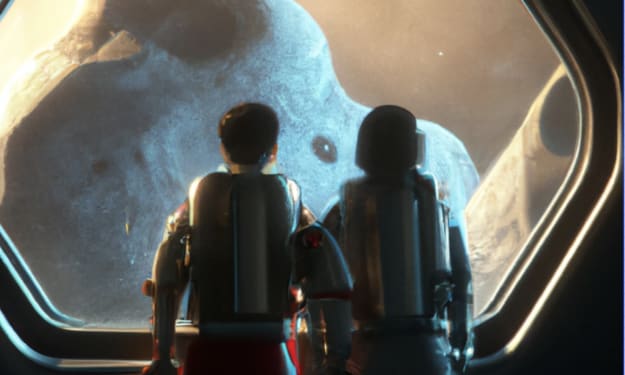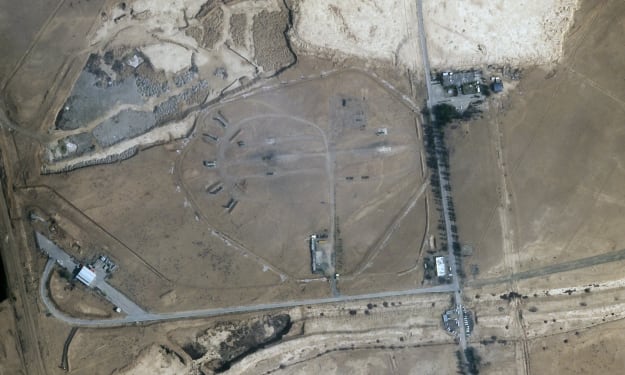Twin Suns Burn in Silence
A short story.

I am in the blue weeds west of Hamlet. Just below me, a cache of white gemshells glint between the fronds. I can see you, too, diving a dozen lengths away, your body blue-white in the filtered light of the suns, shoals of brittlefish darting between us. You turn to look at me, and we are mirrored there beneath the surface for a moment. You see the same thing I do: two boys, nearly men, long fins strapped to their feet. Kelp-weave diving skirts around their hips. Harpoons secured to thighs — yours on the left, mine on the right. Knives and bags tied at the waist. Brown hair pulled back out of the way. The S-shaped birthmarks on the chest, yours right, mine left.
You hand-speak. You’ve seen a fish. And I follow your arm as you point but can’t see it. Before I can hand-speak to ask what kind, you are gone, unhitching the harpoon in a smooth movement, fins kicking behind you. Not a bubble rises from your breath. You could always hold it longer than me.
I kick down to the gemshell colony and with practiced movements pry one from its root with my knife. I pop it into the bag on my belt, and start on the next. The water is warm. It is always warm in The Fields. An equatorial calm. It is the shallowest of the oceans of Umis, and the safest place in the world. Safer than Halla, with its bustling streets full of earthies — people that never leave the island. You and I were born on Hamlet. Raised in its rattling, creaking collection of rafts and huts anchored to The Field. We hopped from plank to plank; ran through its bobbing marketplace. Hamlet has a population of one-hundred-twenty, give or take, and everyone knows everyone. It is home. It was home.
A clicker eel surprises me, darting past my ear with its buzzing squeal, and my knife slips. I feel the blade bite into my hand between thumb and finger and through the pain, I glance for predators who might smell blood — jut-juts or even the nightmare maw of a razorsami. But these creatures rarely venture into the shallow Fields. Still, the adrenaline has raised my heart-rate and I need to surface. I snatch the last two shells and let myself rise — three lengths, two, one. Then my head is out of the water and sound returns. I hear the cries of birds and scaly reeters above, and I inhale gratefully, swimming toward the canoe and tossing the sack of gemshells inside. It opens as it lands, and two or three skitter across the boards. I reach across the gunwales and roll in, slipping off my fins and squatting on my heels to examine the cut. It is not deep, although it is bleeding freely. A few drops fall onto one of the white gemshells, turning it crimson.
I’m astonished at how completely the shell absorbs the colour. It looks almost natural. But true red gemshells are rare. So rare that I have only seen one in my life, and that was in the hands of Tamo — a braggart who claimed he’d dived for it in the dark waters beyond The Field. He said he’d nearly died going so deep; that he’d been circled by the shadows of a dozen razorsami, their long bodies curling in the dark. No one wanted to believe him, but his partner had backed the story, and the gemshell was real enough. The two of them made enough money on that single mollusc to buy a new raft and a larger hut. And somewhere in Halla, a rich earthie would cut up the shell to make an expensive piece of jewellery, or line a box, or whatever it was that earthies did.
They probably threw away the meat.

A half-minute passes before you surface soundlessly and pull yourself in beside me, water dripping from your nose and ears. Your bag is stuffed with gemshells, and you carefully place the poundfish you’ve speared next to the gunwale. It is healthy and fat, and I look for the tell-tale signs of your pride, the smirk, the lowered eyes, but find none. You take pride in very little these days. Neither of us does.
You sit across from me, unconsciously mirroring my posture. But your attention falls to my hand.
I shrug and swivel away, but you reach out and pull my arm back again to examine it. With my opposite hand, I tap the knife at my side, and you sigh so quietly that most would never notice. It is a quiet exasperation, as though I were forever cutting myself. Your little brother — twelve minutes younger and infinitely more foolish.
You can see what I’m thinking and smack me lightly with the back of your hand before turning to fetch a bandage from the bow. You toss it to me and grin, but the smile doesn’t reach your eyes. I know it is not because of my injured hand. It is you. It is us. It is everything.
It is the fishing village of Hamlet.
The people here — our people — are simple in their speech and regular in their habits. They live loud and boisterously. But you and I are the odd ones. Odd for being twins. Odd for our ability to speak with glances and shrugs. It is not telepathy. And even if some believe it, it is not magic. It is just a shared understanding. A closeness. Our lives revolved around each other from birth. We were binary stars, like the suns above Umis.
Our grandmother, our beba, told everyone that twins were auspicious. Children of the suns. And we felt lucky, for a time. Beba filled our heads with stories: Shoka Al Alain, Noelene Ra and all of those figures from myth, who travelled from the stars on ships that could fly. They had machines that could dig and dive, machines that could think, machines that could make knives and clothes and fins and lightning. She told us these people, these deities, settled Umis, and we are their descendants. Beba said there were wonders in Halla. Pictures of the homeworld of Shoka Al Alain — not paintings, but pictures made by machines that captured light. Images from Earth. This, of all details, captured you. You wanted to see those pictures.
Beba believed those stories, and by the strength of her belief so did I. And you — you still do. You want to believe that there is a world in the stars. Our heritage. A place greater than Hamlet.
But no one has heard from that world in two hundred years. If it ever existed, it has gone silent.

The people of Hamlet are superstitious. From the start, they were dubious of the arrival of twins. They accepted our grandmother’s claims that we were lucky, at least until our beba joined our beda in the next world. Then, the doubt crept in.
When the valuable orange gemshells began to dry up, the elders said that it was the result of greed: divers had collected too many young shells for them to reproduce. But some divers grumbled that you and I had brought a kind of curse, and a superstitious blame bubbled below the surface.
Then our father was killed by a razorsami on the very edge of The Fields.
There were quiet condolences, and more rumblings of ill omen. And when more razorsami were spotted, the blame returned, louder than before. Some began to avoid us — people that had once taken us out in boats, played games with us, taught us to tie a line.
You still spoke back then. You spoke more often than me. You wanted to know why. You wanted answers for our alienation, answers for the changes in The Fields, for the shrinking catches, for the incursions by predators. Why was all this happening? What could we do? But when our mother died of an infection the following year, you stopped asking questions. You stopped talking. And the village stopped talking, too — at least to us. We were left to burn in our grief together, the empty hut falling into disrepair. We fished and gathered alone. Collected rainwater in silence. Bartered for supplies without speaking. Only the earthie traders would speak to us, and then return home.
We became ghosts in a village that could not quite bring itself to send us away. And after a while, in our quiet way, we decided it would be better to leave. In hand-talk and glances, you told me you want to leave. To go to the land. To Halla. But we can’t afford the travel. No one from Hamlet will take twin boys across the dark gulf between Hamlet and Halla.
No. Until we barter that journey with an earthie, we live in silence.

In the canoe, your gaze falls to the ruby-coloured gemshell at my feet. You strain forward. I see your eyes go wide for a moment, then sink back to sadness as you realise that it is only blood. I almost laugh.
Yes, if only I had found a cache of red gemshells. And reading this thought on my face, you tap two fingers together in the hand-talk for money. I pretend to squeeze my wound over the bag of remaining gemshells and you kick me playfully.
The suns sink lower. I lift the paddle to return, expecting you to do the same, but you take it from me and lay it aside. A glance at my hand. You don’t want me to hurt it. You tap twice with a thumb on your chest then your right hand flattens in a graceful dive sign. One more dive. You have an idea.
And there is something in your face, something you are hiding from me, and I hate it. It is a disorientating emptiness. It feels like the time I swam beyond the edge of The Fields, where the ground dropped away into darkness. But at the same time, behind your secret, I see the gloom lift just a little. And I am so elated to see that spark that I do not question you. Instead, I lay back and let you pull us through the water with steady strokes, the sound of it lulling me, briefly, to sleep.
I awake to grey sky. To the lapping of waves against the canoe. And there is something not right. It is not windy or raining, but there are waves. Waves like we seldom hear in The Fields.
I sit up.
The suns are lower, but the ocean is dark. Darker than it should be. Hamlet is nowhere to be seen. I scan the horizon, and in the distance, I can see the familiar blue-green of The Fields. You have taken us to the gulf — farther from The Fields than I have ever been. The water is the colour of strong tea. Tiny waves slap ceaselessly against us. The whole world is ocean and sky, and you are no longer in the canoe.
I grasp the gunwale, twisting left and right, scanning the water. The pain in my hand beats like a drum. And just as a spike of panic stabs through me, you come up from those dark waves and haul yourself back inside. You do not grin or even smile, though there is an expression of triumph.
I wait for the explanation as you tie off a rope at the bow of the canoe. It is the anchor line — pulled out to its limit. Deeper than I have ever seen it. I stare harder at you, willing you to speak. Instead, you look down. The blood-soaked gemshell sits at your feet. You nod.
I stare, incredulous. You know that Tamo is a liar. You shrug, then shake your head. You believe this story, I can tell. You believe that this is the place — the red gemshell colony — and you are going to dive for them. But how? How can you know they are here? You point to your ear. You heard him talking to his partner. Yes. You always did like to listen in on others.
You wave your hand toward me. A movement you rarely use, and one I hate. A movement telling me to stay behind. I feel abandoned. Angry. And as I draw breath to stand, you rap my injured hand with your knuckles and I shout out in pain. Your point made, you begin the breathing exercises for a deep dive.
I watch you. I watch you breathe and find myself following along. But I am not performing the exercises — I am panicking, breathless with fear. I turn away from you and reach for my fins, determined to dive. We do things together. Always. And above all, we dive together. This is unassailable. But you see me reaching and get there first, placing the fins behind you, where I cannot reach them without a scuffle.
You look at me, and your face is stone. No, it is like the clear crystal of a gemshell — its surface hard with purpose, and beneath that, the pink of something newly alive.
With swift movements, you loop some ragged twine around the anchor-rope so it can guide you down, and you tie the ends into your belt. Then you smile — the way you always do to reassure me, to tell me we will be together in all things. I shake my head to stop you, but you adjust your fins, sit up, and roll smoothly into your dive with barely a splash. From the canoe, I sign uselessly for you to be careful, but you are already far below. And the last thing I see, as your pale form descends, is the makeshift safety line, old and worn, breaking free of the anchor rope. You do not notice. You are gone.
I hesitate. Nothing moves in the sky or water. I hesitate too long.
Then I am in the bow with my fins, fumbling to put them on. I have nothing to make a safety line from, but I strap on my harpoon, spend a short time oxygenating for depth, and roll in after you.
The water is cold here, and I’m shocked to the point of losing my breath. I surface, frustrated, treading water to regain my bearings. Then I descend again, my bandaged hand throbbing against the rough anchor-rope. I feel the chill sink into me. There is only the anaemic light from the surface cutting past me, and the rope disappearing ahead of me. The darkness is dizzying.
I kick down and still, I cannot see you. How deep have you gone? I feel like I am in the night sky, not the ocean. There are no weeds, no fish, no measures of distance. Far below, I can see something pale. It is not you. It is larger than that. I cannot tell if it is the bottom or just phantoms created by the pressure against my eyes.
And then I spot the shadow.
It passes me, and I feel a shift in the water. It turns, and I see it again, more clearly. And when I understand, my skin crawls. It is the curling mass of a razorsami — its tapering, tubular body; the rows of fins like fletching on an arrow; the round funnel of its mouth; the teeth in their circular rows, spiralling inward. Has it already taken you? Fear and grief overwhelm me at once.
I look at my hand and realise that the thing in the water can smell the slow seep of my blood. The adrenaline makes my lungs burn for air. My hand throbs, and my mind reels. I have to flee — there is no fighting a razorsami head on. But, as if in answer, the creature twists once more and turns almost leisurely toward me.
I am frozen. I think of the harpoon, but my hand will not move. I will perish just like my father, I think. Both of us will perish like our father. This monster is death, and it is so close I can see the white cartilage between its teeth.
But the razorsami begins to thrash. There is blood in the water, and I look down at myself, but it is not mine. The blood is flowing from a wound, a harpoon piercing both sides of the razorsami's mouth. And the thing does not die. Not yet. But I watch amazed as it flees, writhing and twisting.
Then I see you. You are rising through darkness like some hero of old. Like Shoka Al Alain himself. My lungs scream for air, and I fight the urge to breathe. A darkness crowds the edges of my eyesight as you grasp my wrist and tow me upward. We rise and rise with the bubbles, and I cannot remember how you get me into the canoe. I simply find myself here on the boards, the same blood-stained gemshell digging into my back.
I am alive and gulping air, and you look at me again like the younger brother who can only get into trouble. But it doesn't bother me. We are together. And from your dive bag, you remove a handful of gemshells. They sparkle in the fading light of the suns, red as blood. Enough to take us away from the silence of Hamlet. Enough to take us anywhere we want to go. Anywhere on Umis. Anywhere that we will be spoken to. Anywhere that we will be heard.
I let out a laugh, and I see you open your mouth. You are about to speak.
◼︎
About the Creator
Owen Schaefer
Owen Schaefer is a Canadian writer, editor and playwright living in the U.K. He writes fiction, speculative fiction, and breezy articles on writing, AI, and other nonsense. Attacks of poetry may occur.
More at owenschaefer.com






Comments
There are no comments for this story
Be the first to respond and start the conversation.